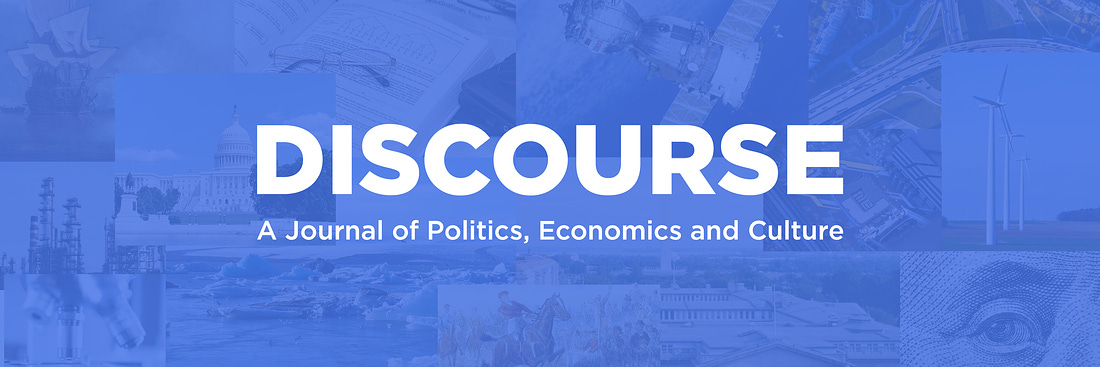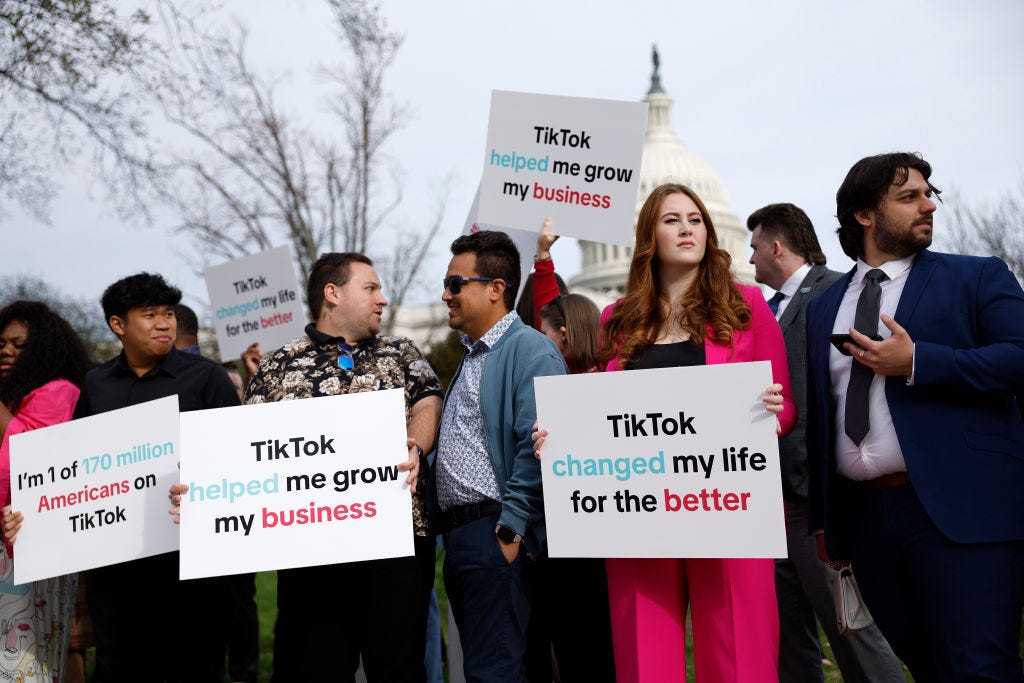|
 |
Why Banning TikTok Would Threaten Liberty and Innovation
Government can provide information about security risks, but ultimately, it should be up to the people to decide which social media platforms they use
Last week, the U.S. Court of Appeals for the District of Columbia Circuit heard arguments on the legality of banning the social media platform TikTok. The debate over whether TikTok should be able to keep operating in the United States brings the issue of government control over digital platforms to the forefront. It’s the latest frontier in the age-old battle between freedom and security, and there are certainly vociferous defenders on both sides.
Given that it is partially owned by the Chinese company ByteDance, TikTok has long been at the center of national security concerns. Some lawmakers argue that the app's data collection practices pose a risk, as Chinese laws could force ByteDance to share sensitive information with the country’s government. Casey Blackburn, assistant director of national intelligence, noted in an affidavit in the case that the Chinese government could attempt to “coerce ByteDance or TikTok to covertly manipulate the information received by the millions of Americans that use the TikTok application every day, through censorship or manipulation of TikTok’s algorithm, in ways that benefit the PRC and harm the United States.”
TikTok users should understand that using the platform comes with risks and decide, based on those risks, whether to continue using it or not. However, a U.S. government ban on TikTok would set a dangerous precedent, infringing on free speech, economic freedom and the future of innovation.
Lawmakers Are Concerned, Americans Less So
Certainly, the primary justification for a TikTok ban is that the platform puts our national security at risk. Lawmakers fear that TikTok’s parent company, ByteDance, could be compelled by Chinese laws to share data such as users' locations and personal details with the Chinese government.
Additionally, concerns have been raised that TikTok could be used to deliver misinformation by controlling the content seen by its American users, especially during politically sensitive times like the U.S. presidential election or the Israel-Hamas conflict. This is a growing worry, given that over half of American adults report that they get at least some of their news from social media. Platforms can easily pick favorites by adjusting their algorithms, content and sources to be shown to users.
Florida Sen. Marco Rubio has called TikTok “China’s digital Trojan Horse,” claiming the app poses an unprecedented risk due to the potential for data misuse. These fears have propelled many lawmakers to back efforts to ban TikTok, believing that the Chinese government could use the platform for surveillance or to sway American public opinion. According to the American intelligence community’s annual report, “TikTok accounts run by a PRC propaganda arm reportedly targeted candidates from both political parties during the U.S. midterm election cycle in 2022.”
Meanwhile, average Americans don’t seem to share many lawmakers’ worries. Pew Research Center polling from the summer found that 42% of Republicans and right-leaning independents supported the ban, while only 24% of Democratic and left-leaning independent voters felt the same. And this support has fallen over time: While 32% of Americans support a TikTok ban today, 50% did in March 2023.
Concerns have also done nothing to curb the platform's popularity globally and in the U.S. TikTok boasts 1.5 billion monthly active users and is now the fifth-most-popular social media platform in the world. Most of its users come from the U.S., with 148 million monthly unique users in this country. If Americans are concerned about the security risks posed by TikTok’s connection with China, they’re not letting it affect their behavior.
A Dangerous Precedent
While lawmakers’ concerns may be legitimate, they’re shortsighted. Focusing solely on TikTok’s risks overlooks the broader issue of how all tech companies—not just those owned by foreign entities—handle user data and are influenced by government officials. While other social media outlets don’t have the same connection with their ownership as those operating in an adversarial foreign country, the influence that the U.S. federal government has on some platforms is concerning. In fact, Facebook came under fire this summer when CEO Mark Zuckerberg publicly stated that during the pandemic the Biden administration pressured the company to censor content related to COVID-19.
Facebook, Google and Instagram collect similarly vast amounts of data, yet they have not faced the same scrutiny. Singling out TikTok with legislation is likely more about political optics and national security concerns than creating meaningful data security reforms. Meanwhile, there has yet to be credible, publicly available evidence of Chinese government actions that would warrant a ban on TikTok in the U.S. Jennifer Huddleston of the Cato Institute argues that banning TikTok could lead to government overreach, setting a precedent for further restrictions on technology under the guise of national security.
A ban would also undermine America’s role as a defender of free speech and openness. If the government starts dictating which platforms Americans can use based on political calculations, it sets the stage for future administrations to limit access to other platforms, potentially leading to broader censorship and reduced competition in the tech ecosystem. Kentucky Sen. Rand Paul highlighted these concerns, noting, “The Supreme Court will ultimately rule it unconstitutional because it would violate the First Amendment rights of over 100 million Americans who use TikTok to express themselves.”
Free Speech and Economic Liberty at Risk
The First Amendment guarantees Americans the right to free expression, and social media platforms like TikTok have become vital tools for communication. Millions of users rely on these platforms to share ideas, create content and engage in discussions. The proposed ban would curb individual choice, as people would no longer be free to decide which platforms to use. Instead of trusting individuals to make informed decisions, the government would be a gatekeeper for what platforms Americans can access.
Virginia Sen. Mark Warner, an architect of the ban, has said, “This is not an effort to take your voice away. … This is not a ban of a service you appreciate. … At the end of the day, they've not seen what Congress has seen.” While Warner’s concerns about data privacy are valid, addressing them by removing individual freedom to choose digital platforms is a imprudent solution that overlooks the broader implications for free speech and innovation.
Banning TikTok would also severely disrupt the economic opportunities it provides for businesses, especially small businesses. TikTok has become an invaluable tool for many entrepreneurs and content creators who rely on the platform to reach new audiences and grow their customer base. Since the pandemic, TikTok has allowed businesses to market their products in creative ways that larger platforms, like Facebook or Instagram, have struggled to match. TikTok’s launch of TikTok Shop in 2023, for example, has attracted more than 500,000 U.S. sellers who use the platform as a key component of their e-commerce strategy. Shutting down TikTok stateside would disproportionately harm these small businesses, removing a vital marketing and sales tools. Such a ban would stifle innovation and damage the dynamic competitive spirit that fuels economic growth.
The potential TikTok ban also raises concerns about market distortion. TikTok operates in a crowded social media space alongside competitors like Instagram, Snapchat and YouTube. Despite their extensive data collection practices, none of these companies are facing bans. If TikTok were banned, it would grant these other platforms an unfair advantage, not through innovation or better service, but because of government intervention.
Companies should rise or fall in a free market based on their ability to innovate, provide value to consumers and compete on a level playing field. When the government intervenes by banning one company, it creates artificial winners and losers. The tech industry thrives on competition, and government overreach in the form of platform bans undermines this competition. Oregon Sen. Ron Wyden has raised similar concerns: “Banning TikTok opens the door for future censorship of apps and technologies deemed politically inconvenient.”
Unleashing the Future … and the Free Market
Social media, artificial intelligence and data-driven technologies are driving a real global transformation. Government bans, however, risk stifling this growth. Instead of restricting platforms and technologies out of fear, we should encourage innovation and competition to allow new technologies to flourish.
By banning TikTok, the U.S. would send a message that government action can stifle innovation. Entrepreneurs may hesitate to invest in new technologies because of concern that their platforms could be shut down based on political whims rather than market forces. If the U.S. wants to maintain its position as a global leader in technology, it must foster an environment that promotes innovation and technological advancement, not one that restricts it.
In a free market, individuals—not the government—should decide which platforms they use. The federal government can certainly provide information for transparency about potential risks, but it should be up to consumers to assess those risks and decide what is best for them. The TikTok ban represents a paternalistic approach to governance, where the government dictates what is safe or unsafe for people, limiting their freedom to make informed choices.
We must recognize that nothing is without risk. Every decision we make involves weighing costs and benefits, and it is not the government’s role to eliminate all potential risks by controlling our choices. Individuals should be trusted to decide whether to use TikTok—or any platform—rather than having the government impose blanket bans.
The question of a TikTok ban represents more than just a national security debate—it raises fundamental questions about the role of government in regulating technology, free speech and market competition. While national security and data privacy are important concerns, banning TikTok is not the answer. Such a ban sets a dangerous precedent that threatens individual liberty, economic freedom and innovation.
As Milton Friedman once said, “A society that puts freedom before equality will get a high degree of both.” The same is true for technology. We must allow the market to work, letting individuals decide how they engage with digital platforms. Banning TikTok risks not only the stifling of innovation but also the erosion of the freedoms that make America’s economy dynamic and competitive.
You’re currently a free subscriber to Discourse .

